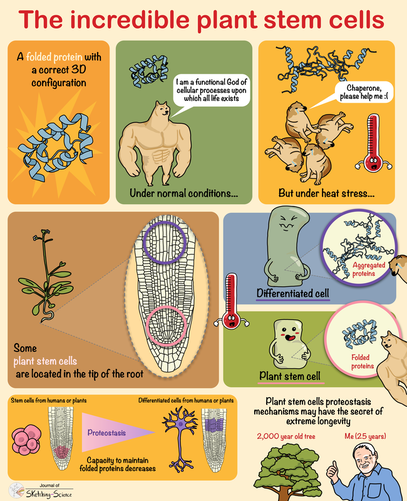|
1/20/2021 0 Comments The intrinsic chaperone network of Arabidopsis stem cells confers protection against proteotoxic stress New preprint from the lab! https://www.biorxiv.org/content/10.1101/2021.01.19.427268v1 Here we sought to understand the proteostasis network of plant stem cells and its impact on plant survival under extreme environmental conditions such as high temperature. The comic by Ernesto Llamas summarizes our results. This project was our first “adventure” on plant biology and it was so much fun that we will continue working on that. The study was led by our very talented postdoc Ernesto Llamas. Also, congrats to all the team! Very thankful to our collaborators Alga Zuccaro and Manuel Rodríguez-Concepción and the funding from the ERC and the Humboldt Foundation. Plant stem cells provide new pools of differentiated cells that form organs and rejuvenate or replace damaged tissues. Protein homeostasis (proteostasis) is required for cell function and viability. However, the link between proteostasis and plant stem cells remains unknown. In contrast to their differentiated counterparts, we find that root stem cells can prevent the accumulation of aggregated proteins even under proteotoxic stress conditions such as elevated temperatures. We also find root stem cells express high levels of distinct chaperones that maintain proteome integrity. By mimicking this proteostasis network in other cells, we could prevent protein aggregation in differentiated cells and confer resistance to heat stress in plants. Taken together, our results indicate that enhanced proteostasis mechanisms in stem cells could be an important requirement for plants to persist under extreme environmental conditions and reach extreme long ages.
0 Comments
Leave a Reply. |
 RSS Feed
RSS Feed
